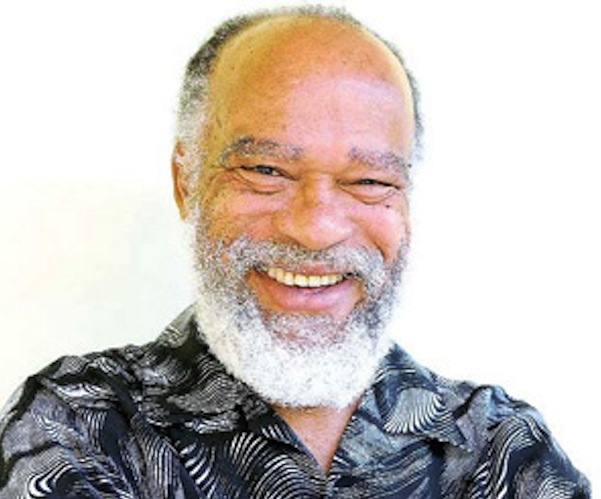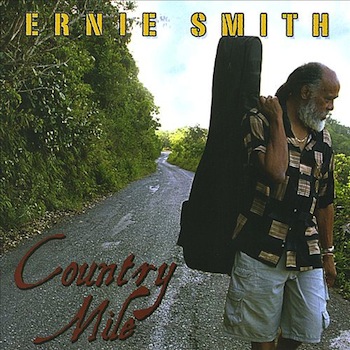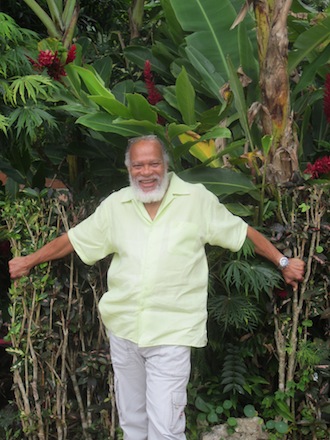Music Preview: Ernie Smith and the Underrated Sound of Jamaica’s Storytellers
While Ernie Smith’s rich baritone and playful lyrics are lamentably absent from venues and festivals that cater to non-Jamaican audiences, he’s found a New England champion in the Rhode Island band Soul Shot.

Singer Ernie Smith — one of Jamaica’s most beloved entertainers.
By Noah Schaffer
Ernie Smith was playing in a South Florida club when an audience member went up to the stage and made a request. Perhaps, the patron suggested, Smith could change gears and play some reggae instead?
Little did the club goer know that they were speaking to one of Jamaica’s most beloved entertainers — a man who needs an entire room in his home in the parish of St. Ann to store the many awards, plaques, and certificates thanking him for his contributions to reggae music. (“And these are just from my current marriage,” laughs Smith.)
But that audience member’s confusion is understandable. Listeners curious about reggae can find easy exposure to Marley-style one drop, slinky dancehall rhythms, rocksteady harmonies, and dub experiments. But playlists and histories often overlook Jamaica’s great storytellers like Smith, his frequent collaborator Pluto Shervington, perennial Jamaica Festival Song Contest winner Eric Donaldson and Byron Lee and the Dragonaires vocalist Ken Lazarus.
Their smooth mix of pop, folk, soul, country and Caribbean rhythms may not fit American and European preconceptions of reggae as a raw ghetto sound, but their hits have been popular for decades in Jamaica and the Diaspora. It’s a fate similar to that of the late uptown bandleader Byron Lee, who faced criticism for leveraging his political connections into appearances at the 1964 World’s Fair and a Dr. No film cameo. Historical studies — including the excellent new documentary Legends of Ska — lament that such opportunities were not enjoyed by ska pioneers the Skatalites. But Lee continued to draw large crowds throughout the Caribbean and North America until his 2008 passing.

While Smith’s rich baritone and playful lyrics are lamentably absent from venues and festivals that cater to non-Jamaican audiences, he’s found a champion in the Rhode Island band Soul Shot, which has frequently backed him throughout New England. They’ll be teaming up on Thursday, August 13 at the Knickerbocker Cafe in Westerly, Rhode Island.
It’s no accident that one of Smith’s first hits, Bend Down, echoes the feeling of classic country music. When Smith was growing up there were nights when the national RJR radio station only played country music. “And that was when there was only one radio station in Jamaica,” points out Smith. Later on he was tapped to open up a Jamaican concert by Johnny Cash, and the two became friends when Cash bought a house in Montego Bay in the mid-’70s.
Smith’s version of the Kris Kristofferson-penned Cash classic Sunday Morning Coming Down is as good as any of ones cut in Nashville. His original Pitta Patta would be right at home alongside the country-soul of Brook Benton or Percy Sledge, while “I Can’t Take It,” with its honky tonk piano and mid-song recitation, echoes the countrypolitan sounds of Ray Price and Jim Reeves. I Can’t Take It became better known as “Tears On My Pillow” after it was covered by Johnny Nash, while “Pitta Patta” didn’t quite fare as well when recorded by Goldie Hawn at the behest of Beach Boys collaborator Van Dyke Parks.
And, just as country music has often used humor to tell the stories from everyday life, Smith’s signature song Duppy or Gumman has become a beloved staple because of how he weaves uniquely Jamaican themes into the catchiest song ever written about impotence.

Ernie Smith today. Photo: Noah Schaffer.
For an artist not usually associated with the political militancy of reggae, Smith paid a heavy price when he did express his views. In 1976, frustrated with self-interested politicians, Smith released the biting Power and the Glory. It was banned from local airwaves and led to Smith’s long life in exile.
Smith has developed a strong following as a club performer in Canada and Florida, but alcohol and drug dependencies have been a drag on his career. After stints in New England and Belize, Smith and his wife Janet have finally settled back in Jamaica, where they live in the mountains just a few miles from Bob Marley’s birthplace. Smith’s most recent output has been a series of albums that draw on his roots in country and gospel, Country Mile and All for Jesus. The latter’s explicit Christianity might be confusing to fans of an artist whose lyrics frequently reference Jah and who wrote an unrecorded musical about Marcus Garvey. Smith compares spirituality to “a radio broadcast. It comes from one tower but is heard by many different people in different ways.”
Today Smith stays busy with overseas engagements as well as his local charity work. He’s more bemused than offended by critics and others forget to give such a prolific hit maker his due in reggae’s history books. It’s the same attitude reflected in another one of the tunes that earns a smile every time a sound system plays it — a song that started as a Red Stripe beer jingle: Life is Just for Living.
Over the past 15 years Noah Schaffer has written about otherwise unheralded musicians from the worlds of gospel, jazz, blues, Latin, African, reggae, Middle Eastern music, klezmer, polka and far beyond. He has won over ten awards from the New England Newspaper and Press Association.
Tagged: Eric Donaldson, Ernie Smith, Knickerbocker Cafe, Noah Schaffer, reggae

My uncle is one of the best when he starts singing you got to move — always loved the sound of his voice. from playing his guitar at our family picnic till this day. His voice has echoed through the years. One love uncle Glen.
Ernie Smith is a fantasitc vocalist and performer. His appearance at the Knickerbocker Club in Westerly is a show not to be missed.